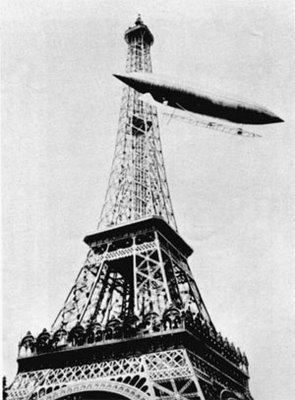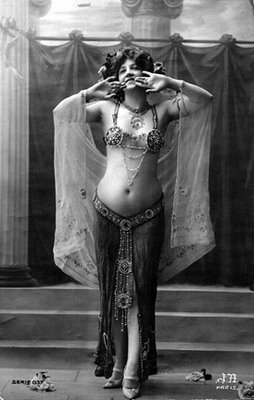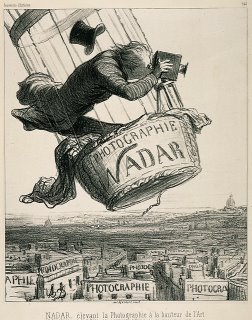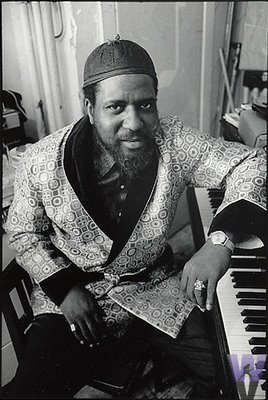
A 1901 Airship. SourceThe Light Over the RangesWas ever an opening line more
packed, more
fraught, than this one?
Ships are docked with lines doubled -- that is, with two sets of ropes or chains holding the vessel to the dock. To "single up all lines" is to remove the redundant second lines in preparation to make way.
Beginning the novel with that attention-centering word "now," Pynchon issues a command -- to us, to himself -- that can be read as an exhortation to
gather loose threads. Given the material to be introduced in the next few pages, which recapitulates an amazing number of the ideas and motifs of Pynchon's career,
all lines are truly being
singled up.The Plot1.The Chums of Chance ready the good ship
Inconvenient, its patriotic bunting flying, for departure. Their orders are to make for the 1893 Chicago World's Fair, and they're excited. Darby Suckling, the Baby" of the crew, who serves as both "factotum and mascotte" and sings the difficult tenor parts, earns five more demerits from Lindsey Noseworth for "informality of speech."
Head Chum Randolph St. Cosmo calls off Lindsey, and turns his attention to Handyman Apprentice Miles Blundell, who has tripped over a picnic basket, shattering crockery -- its familiarity perhaps having "rendered it temporarily invisible" to him. Chick Counterfly, the newest Chum -- his probationary period not yet over -- and a "picklesome youth," razzes Miles' officious loyalty: "Like Sunday school around here."
We meet Pugnax, the ship's dog who is possessed of highly expressive tail and eyebrows but who talks like Scooby-Doo, as he reads
The Princess Casamassima, a volume of Henry James. Pugnax, we learn, was rescued in the "shadow of the Washington Monument" during the course of a dustup between "rival packs of the District's wild dogs," set forth in
The Chums of Chance and the Evil Halfwit. (Gosh,
we don't know any Evil Halfwits in Washington, do we?) We learn how the Chums respond to "calls of nature" over the downwind side of the
Inconvenience -- and how the "lavatorial assaults" have entered into the realm of the religious among the victims below.
Noseworth lectures Darby Suckling on the subject matter contained in
The Princess Casamassima -- the inexorably rising tide of World Anarchism, and we hear of Noseworth's contempt for books -- whose level "can be approached perhaps only by Executive Officers. (Gosh,
we don't know any Executive Officers with contempt for book-learning, do we?) We also learn, through Pugnax's inability to discern one, the curious fact that Noseworth, despite his name,
has no smell.We are informed that the
Inconvenience's aerial-propulsion device, invented by Professor Heino Vanderjuice of New Haven, is "disparaged as no better than a perpetual-motion machine, in clear violation of themodynamical law." We Pynchon Regulars stand up and whinny --
single up all lines!We learn in flashback how Chick Counterfly came to join the Chumps -- rescued from a Ku Klux Klan
posse comitatus come for Chick's carpetbagger father Richard ("Dick"), who had authored a scam to "sell the state of Mississippi to a mysterious Chinese consortium based in Tijuana" and subsequently "absquatulated."
"Do not imagine," Lindsay instructs the new arrival portentously, "that in coming aboard
Inconvenience you have escaped into any realm of the counterfactual.... we must live within the restraints of the given world."
There follows a conversation between Chick and Randolph St. Cosmo that is as thrilling in its
up-singling of all lines as it is maddening in its inconclusiveness. "Going up is like going north," St. Cosmo points out, rather unhelpfully. Chick noodles it through: "If you keep going far enough north, eventually you pass over the Pole, and then you're heading south again.... So... if you went up high enough, you'd be going
down again?"
St. Cosmo deflects the line of questioning, but we're left pondering his mysterious reference to an equal-and-opposite surface, "all too earthly," that one comes to if one goes too high in the sky.
A-and
boy howdy are we reading us some
Pynchon!2.Inconvenience hovers over the Chicago stockyards, its crew in wonderment at the "unshaped freedom" of the West that now is "rationalized into movement only in straight lines and at right angles and a progressive reduction of choices, until the the final turn through the final gate that [leads] to the killing floor."
(Boy howdy!)Inconvenience prepares to descend into the vast population of airships that have convened for the great international gathering of aeronauts held in conjunction with the World's Fair. There commences some Keystone Kops aerobatics, occasioned by Lindsay's loquacity, Blundell's blundering, Counterfly's contrariness, St. Cosmo's stargazing and Darby's suckling. You wonder how these clowns ever survived
any adventures. Sandbags go overboard as the "very mouth of Hell!" gapes wide. Lindsay overcomes St. Cosmo's "familiar inertia," sends Darby aloft to close the opened valve through which their hydrogen was escaping, and the crisis is averted.
The dropped sandbags have flushed a couple -- a clothed man and a nude woman -- from whatever-it-was that they were doing with that camera. As they run, they cast "apprehensive looks upward at the enormous gasbag" that descends alarmingly toward them, "quite as if it were some giant eyeball, perhaps that of Society itself, ever scrutinizing from above, in a spirit of constructive censure." The ship finally anchored to Mother Earth, this sector of the Republic vanishes into the falling darkness.
The Chums descend a Jacob's-ladder to terra firma. Their fellow aeromaniacs, from "laboratory skeptic to Jesus-rapt ascensionary,"
vol á voile in in their finery. The evening is a-twitter with aviatory pleasantries.
The Chums "dedicate a few moments to song, as a group differently engaged might have to prayer."
Miles and Lindsay prepare for "ground-leave" (well, you wouldn't call it "shore-leave," would you?) and receive a strangely ineffectual lecture on safety from St. Cosmo, now dressed in
mufti. Suckling, Counterfly, and Pugnax steel themselves for watch duty. Darby sets to repairing the "very mouth of Hell!" that had caused such consternation earlier in the day. His duty done, he and Chick converse over a cup of coffee and a cubeb cigarette. Chick waxes regretful about his separation from his father -- but their tête a tête is interrupted by the curiously multivocal barking of Pugnax, which heralds the arrival of the Bindlestiffs of the Blue A.C. -- Riley, Zip, and Captain Miss Penelope ("Penny") Black, newly in command of the
Tzigane.
The "gossip, shop talk, and sky-stories" lead to talk of "sightings" -- lights, and sounds too, of a tuneless ethereal choir -- "warnings," sez Riley ominously. Talk turns to the Garçons de '71, an outfit formed during the Franco-Prussian War, renegade military balloonists who, "observing from above" concluded "how much the modern State depended for its survival on maintaining a condition of
permanent siege -- through the encirclement of populations, the starvation of bodies and spirits, the relentless degradation of civility until citizen turned against citizen.... When the Sieges ended, those balloonists chose to fly on, free now of the political delusions that reigned more than ever on the ground, pledged solemnly only to one another, proceeding as if under a world-wide, never-ending state of siege." The war now over, the balloonists choose "to fly on, free now of the political delusions that reigned more than ever on the ground, pledged solemnly only to one another, proceeding as if under a world-wide, never-ending state of siege.
3. The White City, World Columbian Exposition. Source
The White City, World Columbian Exposition. SourceMiles and Lindsay are off to the Fair. Deposited by their cab "a short walk from the Fairgrounds," the electrical glow of the Fair shines in the distance. Paying their way in at a gate "with something of the makeshift about it," they pass through the shadowy darkness of the outskirts, a "strange Limbo" to which exotic exhibits from Africa, India, and Asia -- "not nations of the world but Deadly Sins" -- have been banished. Not for nothing was this "White City" named.
Miles betrays a hitherto unseen clairvoyance in dealing with a three-card monte dealer, a "peculiar feeling" he occasionally gets before "just tripping on my feet again." Once within the relative safety of the White City, the lads make straight for the root beer and "Cracker Jack."
St. Cosmo, however, is still on duty. He makes his way to the office of Nate Privett, Privett Eye. Here it emerges that the Chums -- who now appear to be
mercenaries, to put it bluntly -- will be selling "their services" to exploit their "view from overhead" to fly an extra passenger over the Fairgrounds on that most contemporary of 1893 missions:
Antiterrorist security.Duck soup!Notes and CommentsWe are, if the
AtD Wikipedia page is anything to go by, to expect "four writing styles in the book that hark back to popular fiction of the period. John Clute identifies four 'story clusters', each with one or more prose styles mimicking a popular fiction genre in the style it was written before the end of World War":
- The Airship Boys cluster, which is told in a boys' adventure idiom.
- Western Revenge cluster
- The Geek Eccentric Scientist cluster, which is told in an amalgam of styles.
- The Flaneur Spy Adventuress cluster
Clearly, we're in the Airship Boys style, here, although I'd argue that the last scene, between St. Cosmo and Nate Privett, is beginning to lean into the Western Revenge style.
Mirrorings and binaries
everywhere. The "giant eyeball, perhaps even that of Society itself," stares pitilessly downward on hapless goofball miscreants on the ground, while incipient anarchist balloonists watch Society rip itself to shreds from the same vantage point. "Going up is like going north," in that if you go up far enough, you will finally be going down, to "another surface," this one "all too earthly."
Those who have read
Mason & Dixon will be familiar with the phrase, but Neophytes may not:
As above, so below. Its significance can't be overlooked here.
The Chums oscillate between the anarchist leanings of their brethren in the Garçons de '71 and the necessary discipline of a military unit. If the Chain of Command is broken, their balloon will crash; but note that the Commander, in his "familiar inertia," fails to issue the proper orders, and it is his lieutenant who is forced to break the Chain. Read the word "familiar" in its usual sense, yes, but also leave yourself open to its less used meaning, "of a family." Does that describe the Chums more accurately?
Gotcher
Pynch-o-Meters handy? Good!
1:15-17. The
Pynchon Wiki has already identified Pynchon's Navy experience as one source for the nautical talk. I'd point to another:
Patrick O'Brian, who actually makes an appearance in
Mason & Dixon, as "the finest yarn-spinner in all the Fleets." His carefully researched novels on the British Navy during the Napoleonic Wars heavily influenced Pynchon's nautical language in that book, what with "the weather-gage" and the "Cheerly now...handsomely!"
1:20
Inconvenience. The British Royal Navy
has a
long tradition of warships with names like the following:
Impulsive
Incendiary
Inconstant
Indefatigable
Indignant
Infernal
Insolent
Intelligent
Inveterate
Invincible
Once again, I can't imagine Patrick O'Brian isn't lurking somewhere just offstage...
1:29-30.
World's Columbian Exposition. Go. Read all about it. Perhaps the most salient fact in the Wikipedia article is this one: "The International Exposition was held in a building which for the first time was devoted to electrical exhibits. It was a historical moment and the beginning of a revolution, as Nikola Tesla and George Westinghouse introduced the public to electrical power by providing alternating current to illuminate the Exposition." Given the fact that the flyleaf notes tell us a walk-on by Nikolai Tesla is to be expected, I can't believe that's insignificant.
2:12: Henry James. James did indeed write a book about anarchists named
The Princess Casamassima. "It is the story of an intelligent but confused young London bookbinder, Hyacinth Robinson, who becomes involved in radical politics and a terrorist assassination plot." sez Wikipedia.
2:15.
The Chums of Chance and the Evil Halfwit. If the Chums' exploits have been captured in a series of boys' adventure novels, what are we reading here? Are these guys living in the "real world," or is this another Chums novel? I imagine this question is going to get
real hairy.
2:15 Pugnax. Latin for "likes to fight." Pugnacious. "A dog of no particular breed," but I can only imagine him as a (wait for it!) pug.
7:4
Pelota7:40
Absquatulate
8:3 Thick Bush. Google Maps never heard of it. (
Later edit: Duh! Who's thick?)
11:14 "plummet" Pynchon Wiki sez
"bad physics here."12:38-39 "...the topological genius of Herr Riemann himself." "
Georg Friedrich Bernhard Riemann November 17, 1826 - July 20, 1866) was a German mathematician who made important contributions to analysis and differential geometry, some of them paving the way for the later development of general relativity."
13:23-40. Many light/dark images here, the first I've been able to discern in the book. Not coincidentally, a great deal of "As above, so below" imagery as well.
15:8-30 A great deal of fun can be had trying to work out the melody of Pynchon's "stupid songs," what he's parodying. Discuss?
17:13. Awwww. Chick misses Dick. Does Dick miss Chick?
Every ding-dong day! "We were partners, see?... Swell little moneymaker..." (!!!!! Swell, little moneymaker!)
17:31.
Cubebs. Chinese foofaraw...
18:28
Tzigane. A rhapsody by Ravel. Name means "gypsy."
19:27. Garçons de '71. Fictional, but
check this out: In 1872, the French naval architect Dupuy de Lome launched a large limited navigable balloon, which was driven by a large propeller and the power of eight people. It was developed during the Franco-Prussian war, as an improvement to the balloons used for communications between Paris and the countryside during the Siege of Paris by German forces...
19:29
Siege of Paris19:36 "the infamous
pétroleurs of Paris" Can't find anything...
21:34. "the electrical glow of the Fair." In 1893 this would have been
quite the novel sight: "The International Exposition was held in a building which for the first time was devoted to electrical exhibits. It was a historical moment and the beginning of a revolution, as Nikola Tesla and George Westinghouse introduced the public to electrical power by providing alternating current to illuminate the Exposition..."
22:3-4 (
Later Edit: Oy! Forgot this one!) "...music from a small orchestra, unusually syncopated..." In 1893, we're a little early for proto-jazz, but we're only about five minutes early for
ragtime: "Some early piano rags are entitled marches, and "jig" and "rag" were used interchangeably in the mid-1890s and ragtime was also preceded by its close relative the cakewalk. However, the emergence of mature ragtime is usually dated to 1897, the year in which several important early rags were published."
25:10.
Haymarket bomb: "The Haymarket Riot on May 4, 1886, in Chicago is generally considered to be the origin of international May Day observances and in popular literature, inspired the caricature of "a bomb-throwing anarchist."
25:6.
Doc Holliday25:34 "
duck soup."









